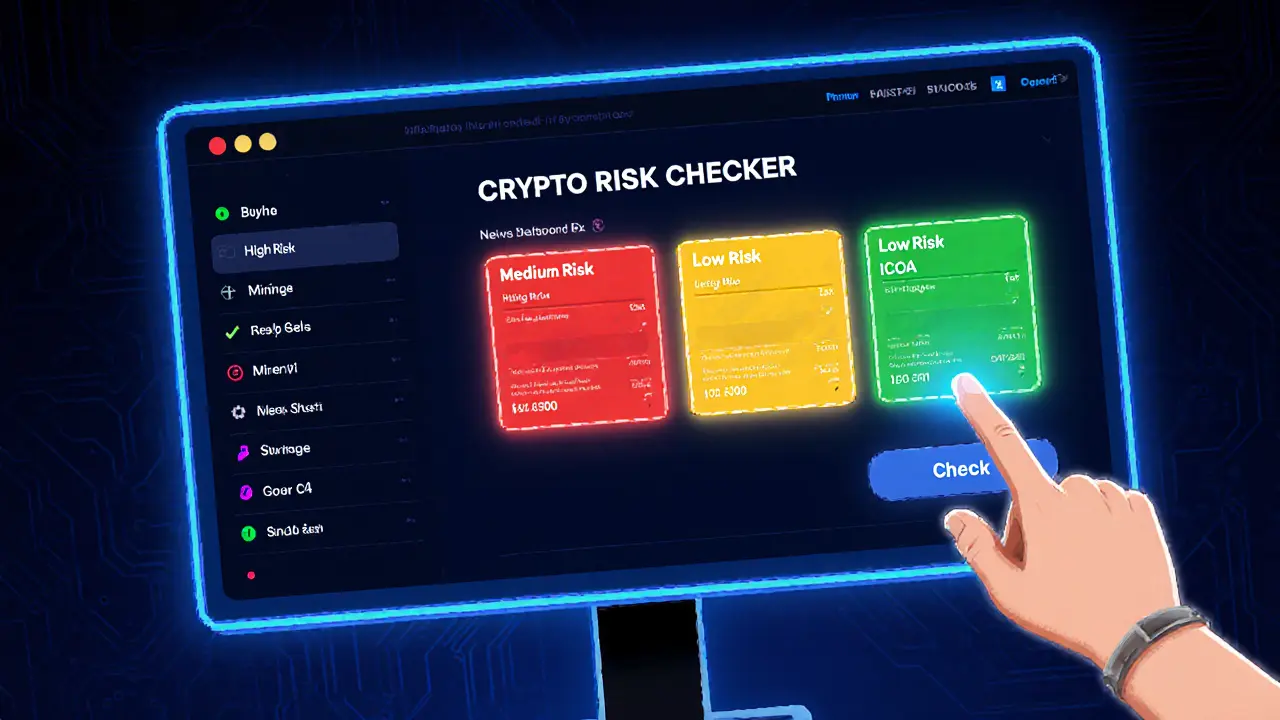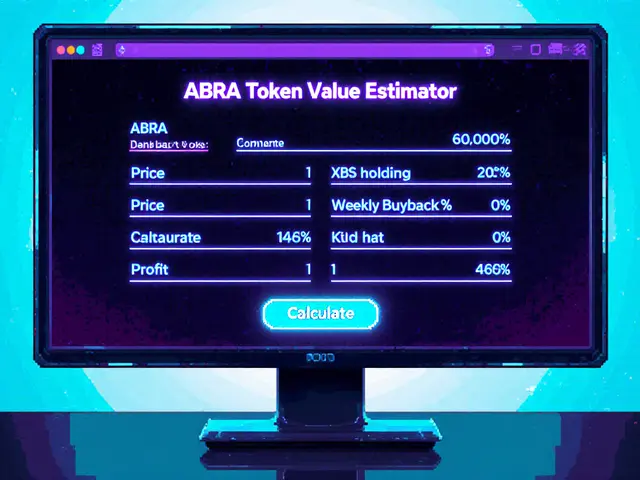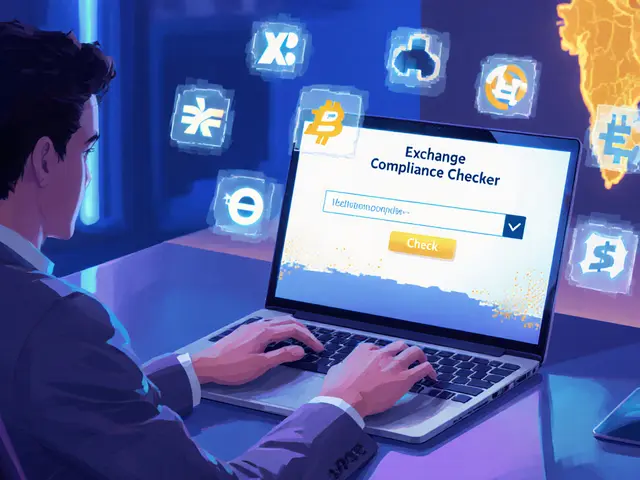Tunisian Crypto Risk Checker
High Risk
Activities that carry significant penalties including imprisonment and asset seizure.
Medium Risk
Activities that may lead to investigation and financial penalties.
Low Risk
Activities that are allowed under strict conditions or exemptions.
Understanding the cryptocurrency regulation in Tunisia is crucial if you’re buying, selling, mining, or even just holding digital assets. The country’s strict 2018 ban turns almost any crypto activity into a criminal offense, with fines and up to five years in prison. Below you’ll find everything you need to know to avoid a legal nightmare, from the key agencies enforcing the rules to practical steps you can take to stay on the right side of the law.
TL;DR - Quick Takeaways
- All crypto trading, mining, payments and token issuance are illegal under the 2018 BCT directive.
- The Central Bank of Tunisia (BCT), the Financial Market Council (CMF) and the Anti‑Money‑Laundering Commission (CTAF) enforce the ban.
- Violations can bring up to five years imprisonment and heavy fines; assets are seized.
- Using VPNs or offshore exchanges does not protect you - banks must report suspicious activity.
- The only legal crypto‑related work is within the government‑approved sandbox and must stay offshore.
What the Law Actually Says
Cryptocurrency regulation in Tunisia is defined by a 2018 directive issued by the Central Bank of Tunisia (BCT) that criminalises any unauthorised virtual‑money transaction, mining operation, or payment in digital assets. The directive is backed by the country’s currency‑control code, which gives authorities the power to fine, imprison, and confiscate crypto‑related assets.
The regulatory landscape is split among three bodies:
- Central Bank of Tunisia (BCT) - sets monetary policy and enforces the 2018 crypto ban.
- Financial Market Council (CMF) - oversees capital‑market activities, including any prospective security‑token offering.
- National Anti‑Money‑Laundering Commission (CTAF) - monitors suspicious transactions and enforces AML rules across all financial institutions.
All three agencies share jurisdiction, meaning a single misstep can trigger multiple investigations.
Key Legal Risks for Individual Traders
For a regular Tunisian who wants to buy Bitcoin, sell Ethereum, or simply hold some tokens, the risks break down into three categories:
- Criminal liability: The 2018 BCT directive treats unauthorised crypto transactions as a violation of the currency‑control law. Convictions carry up to five years imprisonment and fines that can reach several thousand Tunisian dinars.
- Asset seizure: Any crypto‑derived profit discovered by authorities is automatically confiscated. Banks are legally required to flag and freeze accounts that show suspicious inbound or outbound crypto‑related transfers.
- Reporting obligations: Financial institutions must file Suspicious Transaction Reports (STRs) to the CTAF whenever they detect activity that could be linked to digital assets.
Even using a VPN or an offshore exchange does not shield you - Tunisian banks must report any conversion of crypto to dinar, and customs can seize mining hardware on import.
Business Risks - Start‑ups, Exchanges, and Token Projects
Companies thinking about launching a crypto‑related service face an even harsher reality:
- No licensing pathway: The BCT refuses to issue licences for exchanges, custodians or token‑issuance platforms. Operating without a licence is a direct breach of the 2018 directive.
- Accounting prohibition: Local firms cannot record crypto assets on their balance sheets. Attempting to do so exposes the business to fines and criminal charges.
- Sandbox exception - but only for permissioned, offshore deployments: The regulatory sandbox allows limited blockchain projects (e.g., supply‑chain tracking) provided the technology runs outside Tunisia and complies with strict user‑volume caps.
Real‑world examples include local startups like VFunder, Hydro E‑Blocks and No Phobos, which host their infrastructure abroad to stay technically compliant while still benefiting from a sandbox exemption for testing.
Enforcement Mechanisms and Penalties
When authorities catch a violation, they follow a predictable three‑step process:
- Investigation: Customs agents may inspect shipments for ASIC rigs, while banks monitor transaction logs for crypto‑related patterns.
- Seizure: Physical mining equipment is confiscated; digital wallets are frozen, and any crypto balances are transferred to state custody.
- Prosecution: The offender is charged under the currency‑control code, facing a maximum sentence of five years and a monetary fine.
The law treats all crypto‑related activities-trading, mining, ICOs, token marketing-as equally serious. Even a small peer‑to‑peer cash exchange can trigger the full penalty.

How People Try to Bypass the Ban (and Why It’s Still Dangerous)
Despite the risks, a vibrant underground scene persists. Common work‑arounds include:
- Using VPNs to hide IP addresses when accessing foreign exchanges.
- Holding crypto on offshore wallets (e.g., Binance, Kraken) and moving funds via peer‑to‑peer cash trades.
- Conducting in‑person “cash‑for‑crypto” swaps through encrypted messengers.
These tactics are illegal under Tunisian law because the underlying transaction-conversion of crypto into dinar or vice‑versa-still occurs within the country’s jurisdiction. Law‑enforcement agencies routinely monitor international money‑transfer patterns, and many users have reported frozen bank accounts after an STR was filed.
Compliance Checklist for Anyone Touching Crypto in Tunisia
| Action | Legal Status | Risk Level |
|---|---|---|
| Buying crypto on a foreign exchange | Prohibited (conversion to dinar required) | High - possible STR and imprisonment |
| Holding crypto in an overseas wallet | Illegal if ever converted locally | Medium - still subject to investigation |
| Mining Bitcoin with imported ASICs | Explicitly banned | High - equipment seizure and jail |
| Accepting crypto as payment for goods | Illegal for merchants | High - fines and business closure |
| Participating in the BCT sandbox | Allowed under strict conditions | Low - must keep infrastructure offshore |
| Launching a token sale (ICO) | Not permitted publicly; requires CMF prospectus (not approved) | Very High - criminal prosecution |
Follow this checklist step‑by‑step and stop any activity that lands in the “High” or “Very High” column unless you have a sandbox exemption.
What If You’re Already Involved? Damage‑Control Steps
- Stop all crypto‑related transactions immediately. Continuing only deepens legal exposure.
- Secure any physical equipment (mining rigs) and consider relocating it out of Tunisia to avoid customs seizure.
- Seek a Tunisian lawyer experienced in financial‑crime law. Most counsel will advise total disengagement.
- If assets are already seized, you may file an administrative appeal, but success rates are low.
- Document all communications with offshore exchanges for potential future legal defence.
Future Outlook - Could the Rules Change?
There are faint signs of a possible shift. Recent parliamentary debates hint at classifying crypto as a “virtual asset” subject to FATF travel‑rule licensing. The sandbox program continues to accept supply‑chain applications, and the Digital Tunisia 2025 project is developing an in‑house e‑Dinar prototype.
However, no concrete timeline exists. Until the government openly amends the 2018 directive, the safest strategy remains full avoidance.
Quick Comparison: Tunisia vs. Crypto‑Friendly Jurisdictions
| Country | Legal Status of Crypto | Maximum Penalty | Licensing Path |
|---|---|---|---|
| Tunisia | Complete prohibition (2018 BCT directive) | 5 years imprisonment + fines | None - licences not issued |
| Canada | Regulated - crypto considered a commodity | Up to 2 years for AML breaches | Provincial licences available |
| Switzerland | Crypto‑friendly - classified as assets | Up to 3 years for serious fraud | FINMA licences for exchanges |
The stark contrast shows why many Tunisian entrepreneurs relocate to Canada or Switzerland to keep their projects alive.
Frequently Asked Questions
Is it legal to buy Bitcoin on an overseas exchange while living in Tunisia?
No. Even if the exchange is abroad, any conversion of Bitcoin to Tunisian dinar triggers the 2018 BCT ban and obliges banks to report the transaction. You risk imprisonment and asset seizure.
Can I mine cryptocurrency at home using a GPU?
Mining of any kind is expressly prohibited. Customs can seize your hardware, and you could face up to five years in prison.
What does the regulatory sandbox allow?
The sandbox lets permissioned blockchain projects (mainly supply‑chain or record‑keeping) operate for 6‑12 months, but the infrastructure must be hosted outside Tunisia and usage limits are strict.
If my crypto wallet is frozen, can I appeal?
You can file an administrative appeal, but courts usually uphold seizures when the 2018 directive is cited. Legal counsel is essential.
Are there any upcoming reforms that might legalise crypto?
Parliament has discussed a virtual‑asset classification linked to FATF travel‑rule licensing, but no timeline exists. Until a formal amendment is passed, the ban remains in force.







Carl Robertson
February 22, 2025 AT 23:10The Tunisian crypto crackdown is a disaster for innovation.
MARLIN RIVERA
February 24, 2025 AT 00:10What a melodramatic take-if you actually read the law you’ll see the government isn’t inventing problems out of thin air, they’re just enforcing a clear ban.
Rajini N
February 25, 2025 AT 01:10First, it’s essential to understand that the 2018 BCT directive is not a vague recommendation; it is a binding legal instrument that criminalises any unauthorised crypto activity within Tunisia.
Second, the ban applies to both domestic and cross‑border transactions, meaning that even using an offshore exchange does not exempt you once you convert to dinars.
Third, the Central Bank, the CMF, and the CTAF operate in tandem, so a single breach can trigger investigations from all three bodies simultaneously.
Fourth, banks are mandated to file Suspicious Transaction Reports (STRs) for any crypto‑linked conversion, which automatically flags the account for further scrutiny.
Fifth, customs agents have the authority to seize imported mining hardware, and the penalty for mining can include up to five years in prison.
Sixth, merchants who accept crypto as payment risk not only fines but also the possible closure of their business licences.
Seventh, the only legal pathway is the regulatory sandbox, which requires the entire infrastructure to be hosted offshore and limits user volume.
Eighth, any token sale (ICO) is categorised as “Very High” risk and can lead to direct criminal prosecution without a licence.
Ninth, asset seizure is automatic once the authorities establish a link between crypto holdings and a Tunisian resident, and there is virtually no avenue for restitution.
Tenth, even peer‑to‑peer cash swaps are illegal because the underlying conversion to dinars falls under the currency‑control code.
Eleventh, the law treats crypto assets as a form of virtual money, not as property, which means the usual protections for personal assets do not apply.
Twelfth, recent parliamentary discussions about a FATF‑aligned licensing regime are still merely proposals and have no legal effect yet.
Thirteenth, many Tunisians who try to bypass the ban using VPNs are still vulnerable because banks monitor the end‑point of the transaction, not just the IP address.
Fourteenth, seeking legal counsel early can help you mitigate damage, but most lawyers will advise complete disengagement.
Fifteenth, if you’re already under investigation, the best immediate step is to stop all crypto‑related activity and preserve any correspondence for a potential defence.
Sophie Sturdevant
February 26, 2025 AT 02:10The regulatory framework essentially aggregates crypto into the existing AML‑CFT matrix, so compliance obligations mirror those of traditional finance, just with added forensic scrutiny on blockchain analytics.
Nathan Blades
February 27, 2025 AT 03:10Honestly, the whole situation feels like watching a dystopian movie where the villain is a central bank that thinks it can outlaw technology forever.
Somesh Nikam
February 28, 2025 AT 04:10It’s tough, but remember that every setback is a chance to reassess – moving hardware abroad or switching to a sandbox‑approved use case can keep you on the right side of the law.
Jan B.
March 1, 2025 AT 05:10TL;DR: stay out of the sandbox, keep assets offshore, and don’t convert to dinars.
Andy Cox
March 2, 2025 AT 06:10yeah, just keep it simple and avoid any local cash‑in.
Debby Haime
March 3, 2025 AT 07:10From an entrepreneurial standpoint, the risk‑reward calculus in Tunisia is heavily skewed toward risk, so relocating your project is often the smartest move.
emmanuel omari
March 4, 2025 AT 08:10People need to stop romanticising crypto; it’s a tool, not a right, and governments worldwide are tightening controls for legitimate reasons.
Courtney Winq-Microblading
March 5, 2025 AT 09:10While the sentiment captures a certain truth, we must also consider the social and financial inclusion that crypto can bring if regulated responsibly.
katie littlewood
March 6, 2025 AT 10:10I love that the post breaks down the whole regulatory maze into bite‑size chunks; it’s incredibly helpful for newcomers who feel overwhelmed by legal jargon.
What really stands out to me is the clear delineation of risk tiers – you can instantly see which activities are "High" versus "Low" without having to parse dense legal text.
Also, the inclusion of a practical checklist is gold; I’ve saved that table for quick reference whenever I discuss crypto with friends in Tunisia.
The sandbox explanation is spot on: it’s the only legitimate pathway, yet it’s so restrictive that most startups will opt to move offshore.
One suggestion: maybe add a short section on what “FATF travel‑rule licensing” could look like in practice, since the post hints at future reforms.
Overall, the guide is thorough, well‑structured, and exactly the kind of resource that can empower people to make informed decisions instead of shooting blindly into a legal minefield.
Jenae Lawler
March 7, 2025 AT 11:10While the exposition is commendably exhaustive, one must question the implicit assumption that all readers possess the requisite legal acumen to navigate such intricacies unaided; a more prudent approach would be to advocate unequivocally for professional counsel rather than merely suggesting “stop and think.”
Chad Fraser
March 8, 2025 AT 12:10Let’s keep the momentum going – if you’re thinking about a sandbox project, start drafting a compliance roadmap now and reach out to the BCT early.
Jayne McCann
March 9, 2025 AT 13:10Honestly, the sandbox is just a PR stunt; you’ll still face the same red tape.
Richard Herman
March 10, 2025 AT 14:10It’s clear that the safest route for anyone dabbling in crypto in Tunisia is to stay fully offshore and avoid any local conversion, which aligns with the risk matrix laid out above.
Carl Robertson
March 11, 2025 AT 15:10Agreed-if the government wants to keep up with the times, they should consider a nuanced framework instead of blanket bans.